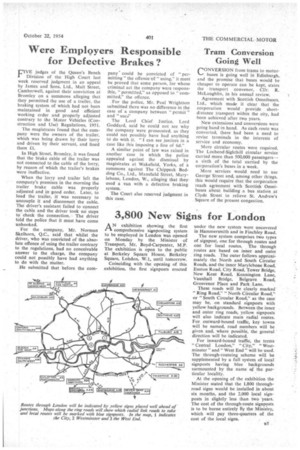Were Empluers Responsible for Defective Brakes ?
Page 39

If you've noticed an error in this article please click here to report it so we can fix it.
FIVE judges of the Queen's Bench Division of the High Court last week reserved judgment in an appeal by James and Sons, Ltd., Malt Street, Camberwell, against their conviction at Bromley on a summons alleging that they permitted the use of a trailer, the braking system of which had not been maintained in good and efficient working order and properly adjusted contrary to the Motor Vehicles (Construction and Use) Regulations, 1951.
The magistrates found that the company were the owners of the trailer, which was being drawn by their lorry and driven by their servant, and fined them 11.
In High Street, Bromley, it was found that the brake cable of the trailer was not connected to the cable of the lorry, by reason of which the trailer's brakes were ineffective.
When the lorry and trailer left the company's premises in the morning the trailer brake cable was properly adjusted and in good order. Later, to load the trailer, it was necessary to uncouple it and disconnect the cable. The driver's assistant failed to connect the cable and the driver took no steps to check the connection. The driver told the police that it must have come unhooked.
For the company, Mr. Norman Skelhorn, Q.C., said that whilst the driver, who was convicted of the absolute offence of using the trailer contrary to the regulations, had no conceivable answer to the charge, the company could not possibly have had anything to do with the matter.
He submitted that before the com
pany • could be convicted of " permitting " the offence 'of" using," it must be proved that some person, for whose criminal act the company were responsible, "permitted," as opposed to " committed," the offence.
For the police, Mr. Paul Wrightson submitted there was no difference in the case of a company between " permit " and "uses' The Lord Chief Justice, Lord Goddard, said he could not see why the company were prosecuted, as they could not possibly have had anything to do with it. "I can see justices in a case like this imposing a fine of 6d."
A similar point of law was raised in another case in which the police appealed against the dismissal by magistrates at Wakefield, Yorks, of a summons against The Chippeck Bedding Co., Ltd., Mansfield Street, Marylebone, London, W., alleging that theyused a van with a defective braking system.
The Court also reserved judgment in this case.




































































































